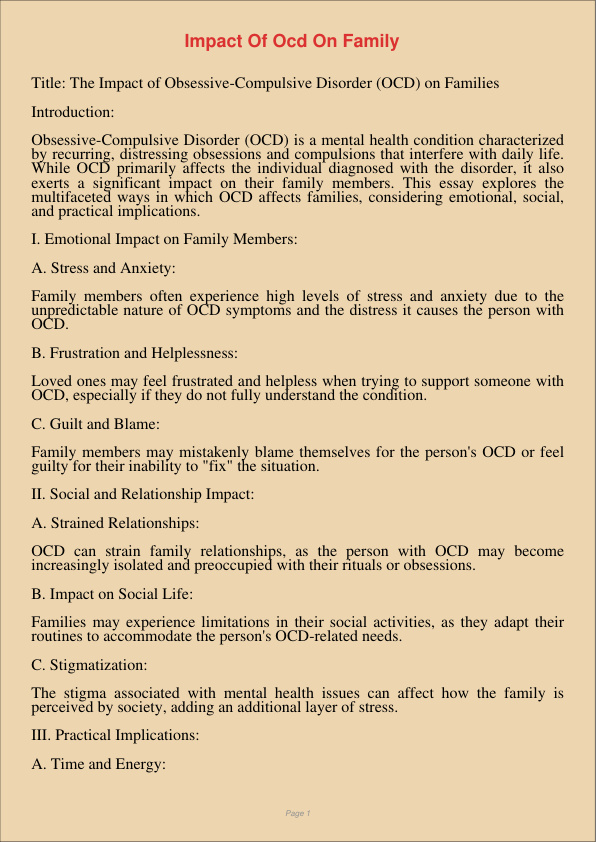
Title: The Impact of Obsessive-Compulsive Disorder (OCD) on Families
Introduction:
Obsessive-Compulsive Disorder (OCD) is a mental health condition characterized by recurring, distressing obsessions and compulsions that interfere with daily life. While OCD primarily affects the individual diagnosed with the disorder, it also exerts a significant impact on their family members. This essay explores the multifaceted ways in which OCD affects families, considering emotional, social, and practical implications.
I. Emotional Impact on Family Members:
A. Stress and Anxiety:
Family members often experience high levels of stress and anxiety due to the unpredictable nature of OCD symptoms and the distress it causes the person with OCD.
B. Frustration and Helplessness:
Loved ones may feel frustrated and helpless when trying to support someone with OCD, especially if they do not fully understand the condition.
C. Guilt and Blame:
Family members may mistakenly blame themselves for the person’s OCD or feel guilty for their inability to “fix” the situation.
II. Social and Relationship Impact:
A. Strained Relationships:
OCD can strain family relationships, as the person with OCD may become increasingly isolated and preoccupied with their rituals or obsessions.
B. Impact on Social Life:
Families may experience limitations in their social activities, as they adapt their routines to accommodate the person’s OCD-related needs.
C. Stigmatization:
The stigma associated with mental health issues can affect how the family is perceived by society, adding an additional layer of stress.
III. Practical Implications:
A. Time and Energy:
Families often invest significant time and energy in accommodating the person with OCD, such as assisting with rituals or seeking treatment.
B. Financial Costs:
The cost of therapy, medication, and other treatments can place a financial burden on families, adding to their stress.
C. Lifestyle Adjustments:
Families may need to make significant lifestyle adjustments to provide the necessary support and minimize OCD-related triggers.
IV. Coping Strategies and Support:
A. Education:
Knowledge about OCD can empower family members to better understand the disorder and its management.
B. Open Communication:
Encouraging open, non-judgmental communication within the family can help address emotional challenges and build a support system.
C. Professional Help:
Seeking support from mental health professionals, such as family therapy or counseling, can be beneficial for both the individual with OCD and their family.
V. Conclusion:
OCD is a challenging condition that not only affects the individual directly but ripples through their family, influencing emotions, relationships, and daily life. It is essential for families to recognize and address the impact of OCD, supporting their loved ones in seeking appropriate treatment and adopting coping strategies. By fostering understanding, patience, and communication, families can contribute to the well-being of their loved ones with OCD and ultimately reduce the overall burden of the disorder on the family unit.
「真诚赞赏,手留余香」
真诚赞赏,手留余香
使用微信扫描二维码完成支付
